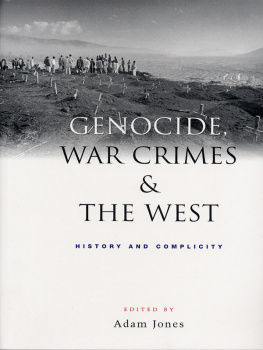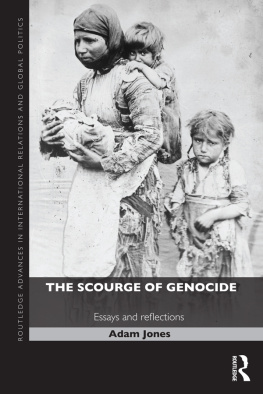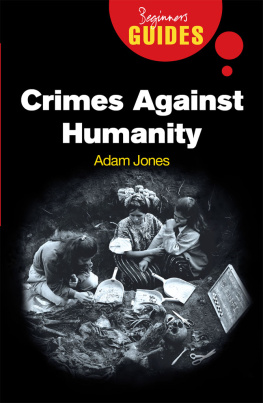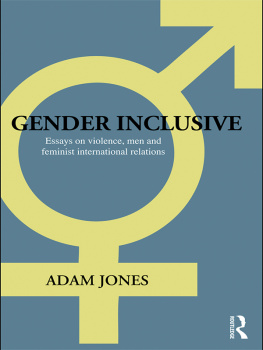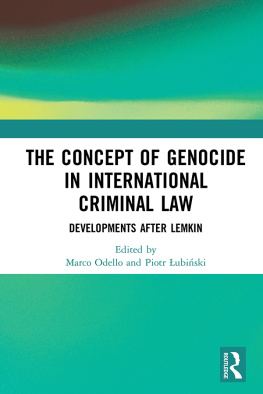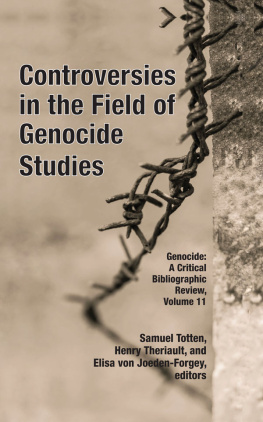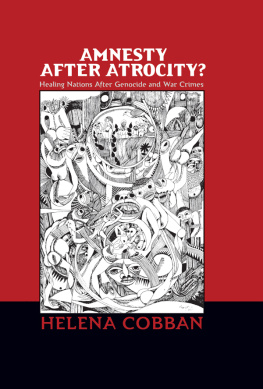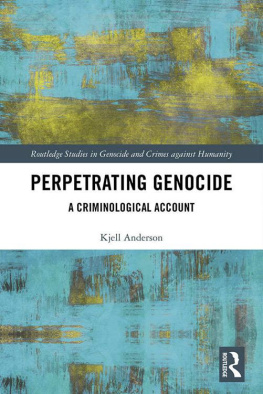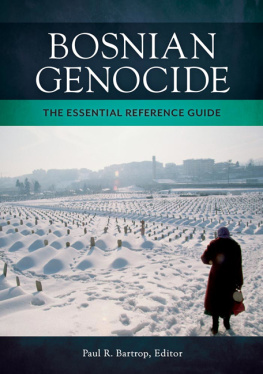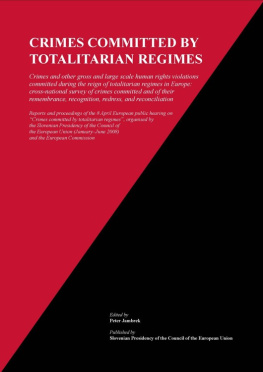
Genocide, War Crimes and the West
History and Complicity
Edited by Adam Jones

Zed Books
LONDON | NEW YORK
Genocide, War Crimes and the West was first published in 2004 by Zed Books Ltd, 7 Cynthia Street, London NI 9JF, UK, and Room 400, 175 Fifth Avenue, New York, NY 10010, USA
This ebook edition was first published in 2013
www.zedbooks.co.uk
Copyright Adam Jones 2004
The right of the contributors to be identified as the authors of this work have been asserted by them in accordance with the Copyright, Designs and Patents Act, 1988
Designed and typeset in Monotype Bembo by Illuminati, Grosmont Cover designed by Andrew Corbett Printed and bound in Malaysia
Distributed in the USA exclusively by Palgrave Macmillan, a division of St Martins Press, LLC, 175 Fifth Avenue, New York, NY 10010
All rights reserved
A catalogue record for this book is available from the British Library
Library of Congress Cataloging-in-Publication Data available
ISBN: 978 1 84813 682 3
Contents
Adam Jones |
Peter Stoett |
Jan-Bart Gewald |
Ward Churchill |
Eric Langenbacher |
Raphalle Branche |
CHAPTER 7: | Peter Dale Scott |
S. Brian Willson |
Jean-Paul Sartre |
Mario I. Aguilar |
Suhail Islam and Syed Hassan |
Steven L. Jacobs |
Thomas Turner |
Mohamed Diriye Abdullahi |
Linda R. Melvern |
Denis J. Halliday |
DOCUMENT 2 |
Ramsey Clark |
David Bruce MacDonald |
Peter G. Prontzos |
Ernesto Verdeja |
Arthur Jay Klinghoffer |
Francis Njubi Nesbitt |
World Conference Against Racism |
Adam Jones |
Breyten Breytenbach |
PART I
Overview
Introduction: History and Complicity
Adam Jones
In April 2001, convicted mass murderer Timothy McVeigh about to die in the first US federal execution in 150 years sent a letter to a Fox News correspondent seeking to explain why I bombed the Murrah Federal Building in Oklahoma City, killing 168 people. He referred to his terrorist action as a retaliatory strike and counterattack for the FBI attack against the Branch Davidians at Waco, Texas. But McVeigh then took a surprising analytical leap, turning to identifiable pattern[s] of conduct by the US government in the international sphere:
borrowing a page from US foreign policy, I decided to send a message to a government that was becoming increasingly hostile, by bombing a government building and the government employees within that building who represent that government. Bombing the Murrah Federal Building was morally and strategically equivalent to the US hitting a government building in Serbia, Iraq, or other nations. Based on observations of the policies of my own government, I viewed this action as an acceptable option. From this perspective, what occurred in Oklahoma City was no different than what Americans rain on the heads of others all the time, and subsequently, my mindset was and is one of clinical detachment.
There is no reason, of course, to question depictions of McVeigh as a murderous thug. His letter nonetheless raised some pertinent questions. Why was McVeighs murderous thuggery and free-lance fanaticism ()
). Accounts differ as to what happened when the team arrived in the hamlet. According to Kerrey, the Seals came across a hooch (house) that had not appeared in intelligence reports. Weve got some men here, we have to take care of them, Kerrey said he was told by members of his team. That meant collective killing: Standard operating procedure was to dispose of the people we made contact with. Kill the people we made contact with, or we have to abort the mission. Kerrey said he took no part in these initial killings. The team moved on to another cluster of dwellings, where, according to Kerrey, it came under fire, which was returned. Twelve hundred rounds of US ammunition later, Kerrey said he made a terrible discovery. In the hooches, I was expecting to find Vietcong soldiers with weapons, dead. Instead I found women and children.
Other testimony, though, suggested an even more grisly, and systematic, slaughter of civilians. Kerreys Navy Seal comrade Gerhard Klann claimed that Kerrey had been fully aware that the units eventual victims were civilian women and children, and had given the order anyway to mow them down in cold blood. Klann says that Kerrey gave the order and the team, standing between 6 and 10 feet away, started shooting raking the group with automatic-weapons fire for about 30 seconds. They heard moans, Klann says, and began firing again, for another 30 seconds. There was one final cry, from a baby. In response, Kerrey claimed that even if Klanns account were true, the actions were defensible. Under the unwritten rules of Vietnam, we would have been justified [in killing civilians even] had we not been fired upon. You were authorized to kill if you thought that it would be better. We were instructed not to take prisoners ().
The US media and public response to Kerreys confession was striking: many Americans seem[ed] quicker to sympathize with the former war hero [Kerrey] and to lament the horror of war rather than focus on the real issues of crime and justice ().
), called for the establishment of a South African-style truth commission to investigate US war crimes in Vietnam. Suppressed atrocity, Shapiro wrote, haunts not just its victims and shadows not just its perpetrators, but distorts the political life of entire societies.
The broader debate over Vietnam, after a decade or more of jingoistic posturing, re-crystallized around the figure of former US Secretary of State Henry Kissinger (see the chapters in this volume by Mario Aguilar, Steven Jacobs, and Suhail Islam and Syed Hassan). Kissinger, and the administrations he served, were directly or indirectly responsible for some of the bloodiest crimes of the post-World War II era. They included the sustained US bombing campaigns against peasant societies in Vietnam, Cambodia, and Laos; the Indonesian invasion of East Timor in December 1975, which rapidly assumed genocidal dimensions; and the West Pakistani assault on what was shortly to become independent Bangladesh, in 197071, a more gigantic slaughter still. On a smaller scale, but at a cost of thousands more lives, Kissinger encouraged, aided, and abetted the military coup that overthrew the democratically elected government of Salvador Allende in Chile in 1973.
Kissinger has retained a considerable cachet within the United States, as evidenced by his appointment to head the commission struck to investigate the events of 11 September 2001. (Kissinger accepted but subsequently withdrew, citing possible conflicts of interest.) A growing number of voices, however, have called for him to play a very different role: that of prisoner in the dock. The case for arraigning Kissinger for war crimes and crimes against humanity was made most prominently, and pithily, by the British journalist Christopher Hitchens, whose two-part series for
Next page
